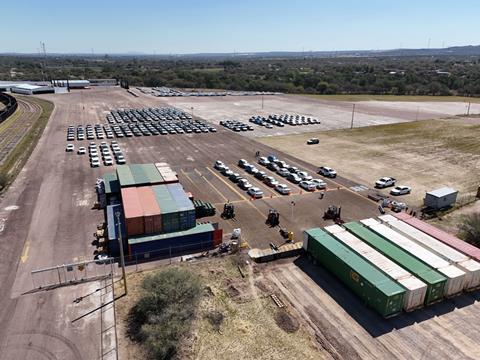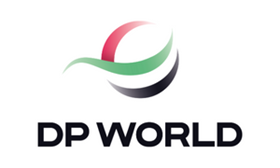PARTNER CONTENT
This content was produced by Automotive Logistics in partnership with DP World
Putting cars in containers has proven to be a valuable alternative to capacity-strapped ro-ro and multilevel rail transport and it is just one way that DP World is enhancing service capabilities for its automotive customers, writes Christoph Seitz, global vice-president of finished vehicles.
Picture this: a sprawling car plant in Mexico, where rows of brand-new vehicles sit idle, waiting for a ride north to eager customers in the US and Canada. The traditional transport routes – ro-ro ships and multilevel rail cars – are stretched to their limits, causing costly delays and bottlenecks. The industry is stuck in a capacity gridlock, with no immediate relief in sight. But what if there was a way to break free from this congestion, move these vehicles faster and more efficiently and reduce environmental impact?
That’s where our Cars in Containers (CIC) initiative comes in. This isn’t just a temporary fix – it’s a strategic shift. Over the past 18 months, traditional modes of transporting finished vehicles have come under immense pressure, leading to delays, increased costs and inefficiencies, particularly in North America. We’ve seen firsthand how CIC can transform logistics for OEMs facing these bottlenecks. CIC is a lifeline for an industry that can’t afford delays, tackling today’s challenges while paving the way for a more resilient, efficient and sustainable future in automotive logistics. Yet, CIC is just one component of our broader strategy at DP World, aimed at revolutionising finished vehicle logistics globally through innovation and enhanced service capabilities.

Containers and racking systems
As these pressures mount, the need for innovative solutions becomes clear. The global automotive logistics landscape is evolving rapidly, with traditional methods facing significant challenges. Despite a slew of new ships coming online, ro-ro vessels are still in short supply; key ports around the world are experiencing bottlenecks and OEMs are shifting towards direct-to-consumer sales models. These issues demand more flexible and scalable logistics solutions.
Our CIC initiative responds directly to these challenges. By utilising 53-foot intermodal containers and innovative racking systems – a solution that allows for secure, damage-free vehicle transport with adjustable and reusable racks – we can transport up to six vehicles per container. This approach significantly enhances efficiency and reduces costs for OEMs, making it a crucial solution as the industry navigates increasing logistical pressures.
While CIC is a key innovation, our vision for finished vehicle logistics extends well beyond containers. At DP World, we are transforming our vast ports and terminals (P&T) network into comprehensive logistics hubs, offering an array of value-added services such as pre-delivery inspection (PDI) and compound management. These services streamline the entire logistics process, providing OEMs and other logistics services providers with end-to-end support and flexibility. This enables us to assist OEMs and logistics companies across the entire logistics chain, enhancing their operations with adaptable and efficient services that go beyond traditional transport.
North America, facing severe multilevel rail car shortages, became the first region to validate the CIC initiative. By introducing our 53-foot container solution to a major OEM manufacturing in Mexico, we demonstrated that transporting cars in containers by rail – or short sea – is both operationally viable and commercially beneficial. This early success has sparked interest among other OEMs, and we are now densifying our CIC network across regions worldwide, ensuring we can address similar challenges wherever they arise.

Long-term vision
Putting cars in containers has always been part of the outbound mix for car companies, but with our innovations, they’re becoming a more critical component of the logistics strategy. CIC, however, will not replace ro-ro, multilevel rail, or over-the-road trucking, as those methods remain commercially viable and continue to play a dominant role.
CIC represents more than just an operational tweak; it’s a key part of our broader strategy at DP World. Since acquiring CFR Rinkens and my appointment as global vice-president for finished vehicles last November, we’ve expanded our finished vehicle logistics strategy, leveraging our P&T network and containerisation expertise to offer OEMs a stable, efficient and flexible logistics solution through port-centric logistics. Each P&T location is being developed to manage CIC and provide additional services such as vehicle storage and custom PDI, enhancing value across our clients’ supply chains, whether ro-ro or CIC. Port-centric logistics offer significant value by minimising costs and reducing handling needs compared to off-site yards, meeting the high demand from OEMs for more value-added services (VAS) directly within our ports. This approach allows for direct distribution to dealers, avoiding additional transport costs and minimising damage risks with each handling or transfer.
Enhancing supply chain efficiency and sustainability
Efficiency in logistics goes beyond moving goods faster; it’s about achieving speed while minimising environmental impact and developing systems that contribute to a circular economy. While reusable racking systems are often perceived as more expensive than disposable ones, our extensive rack network allows us to achieve greater cost-efficiency. In many cases, reusable racks can be as affordable – or even less expensive – than disposable alternatives. This is increasingly important as the automotive industry moves towards more sustainable practices.
At DP World, our approach to logistics is deeply integrated with our commitment to leading the industry toward a sustainable future. By actively measuring environmental benefits and minimising waste, we offer OEMs transport solutions that not only meet their operational needs but also align with their long-term sustainability goals. The CIC initiative is a key driver in reducing the carbon footprint of vehicle logistics and fostering the adoption of greener practices across the automotive sector.
The future of automotive logistics
The future of automotive logistics is being shaped by several converging trends, including the rise of electric vehicles (EVs), shifting geopolitical landscapes and evolving consumer demands. Electric vehicles will dominate by 2035 but transporting them safely and efficiently presents its own set of challenges. For instance, the industry is currently facing significant safety concerns related to EVs on ships, especially the risk of fires that are challenging to extinguish.
However, I’m optimistic. Continuous improvements in battery and charging technology will address these challenges, and at DP World, we’re positioning ourselves to lead in this space. We’re heavily investing in EV battery capabilities, exploring new markets and expanding our logistics network to cover the full EV battery supply chain, from transporting raw materials from the mines to recycling.
We’re already working with a large lithium-ion battery recycling company, shipping recycled raw materials for them. This initiative is not merely about logistics; it contributes significantly to the automotive industry’s shift towards a circular economy. As recycling technologies advance, more of the older fleet’s batteries will be recycled, reducing the need to mine new materials.
Our CIC initiative and our investments in battery recycling represent key pillars of DP World’s forward-looking strategy in the automotive logistics sector. By integrating innovation transport solutions with comprehensive P&T services and sustainable practices, DP World is addressing current challenges while also building a foundation for a more resilient, efficient and environmentally responsible supply chain. As the automotive industry continues to evolve, we will remain at the forefront, driving the next wave of innovation and sustainability in vehicle logistics.
For more on DP World and its finished vehicle logistics offerings, click here.

























![Global[1]](https://d3n5uof8vony13.cloudfront.net/Pictures/web/a/d/s/global1_726550.svgz)














No comments yet